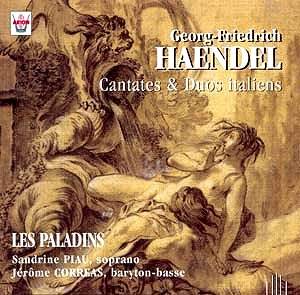
|
Georg Friedrich HAENDEL
(1685-1759) Cantatas and Italian Duets Quando in calma ride il mare (duo) Nellí africane selve ** Che vai pensando (duo) La Lucrezia * Gi_ nei Tartarei regni (duo) Dalla Guerra amorosa ** Tacete ohime (duo) Les Paladins ** Jérôme Correas, baritone-bass Emmanuelle Haïm, harpsichord (and chamber organ; not specified in the notes) Marion Middenway, cello Rec: December 1999. |
During Haendel's first journey to Italy, from 1706 to 1710, he learned a great deal about the Italian style of music, especially vocal music from Italian operas. This learning was used throughout the remainder of his career in the composition of his own works.
He wrote some 20 Italian duos, which are basically small-scale cantatas for two voices (mostly for two high voices, such as soprano and alto, or two sopranos). The duos on this recording are for soprano and baritone or bass, and their accompaniment is minimal: either harpsichord and cello, or chamber organ and cello. These works are very similar to the types of duos found in Haendel's operas, and they can be technically demanding. The second part of the duo Gionei Tartarei regni is almost a fugue, with its rapid series of brief notes over a very minimal accompaniment. While Sandrine Piau's soprano is excellent, Jérôme Correas sounds a bit weak and, at times, he seems to be struggling to keep up with the music.
The three cantatas on this recording are much more interesting. Nellí africane selve is a very dramatic, operatic piece. Jérôme Correas is far more effective here, especially in the second movement, an aria, with its plaintive obbligato cello melody accompanying him. La Lucrezia, featuring soprano Sandrine Piau, is certainly the highpoint of this recording. This 10-part cantata, on the theme of the rape of Lucrezia, contains some beautiful arias, extremely well-performed by Piau. Again, this is a more dramatic music than the duos, and calls for a full range of emotions, which Piau transmits beautifully. Her range is excellent, and she easily handles the score, which calls for some acrobatic leaps.
This is a somewhat austere recording - both musically and instrumentally. While some of the works are quite attractive, melodically, especially the soprano cantata La Lucrezia, not all of them have the same attraction.
A recording for true fans of Haendel's vocal works. This somewhat uneven disc has its good points, but, in the end, is lacking in overall attraction.
Kirk McElhearn